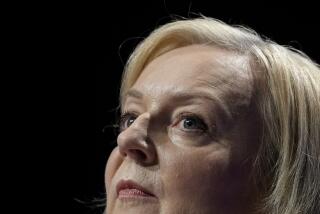Australia’s new prime minister fends off sell-out accusation
- Share via
CANBERRA, Australia — The honeymoon did not last long for Malcolm Turnbull. Just days after he took over as prime minister of Australia the attacks have started, with opponents accusing him of selling his ideological soul on issues from climate change to gay marriage in order to snatch the nation’s top job.
So far, opinion polls suggest the new leader is popular but there are questions about how his public image might evolve in office. There are also doubts that this self-made multimillionaire — who was once dumped as party leader — will become a unifying figure who can lead his Liberal Party to victory in next year’s elections.
As prime minister, Turnbull has already shifted some of his stances on key issues. Previously, he riled the more conservative elements of his coalition by arguing for tougher action on Australia’s greenhouse gas emissions — calling for polluters to pay for the carbon they emit — and advocating for marriage equality.
But after he ousted his predecessor Tony Abbott in an internal party vote Monday night, Turnbull essentially promised the more conservative junior coalition partner, the rural-based Nationals, he would keep the party line on climate change and opposing gay marriage.
Climate change appeared to be an issue Turnbull felt passionately about. When he was dumped in 2009 after 14 months as opposition leader, he defiantly told his colleagues: “I will not lead a party that is not as committed to effective action on climate change as I am.”
Abbott’s government last year repealed a carbon tax that had been levied for two years on the country’s worst industrial polluters, and instead offered 2.55 billion Australian dollars ($1.8 billion) in taxpayer-funded incentives to encourage polluters to operate more cleanly — a policy Turnbull now says he backs.
Members of the opposition Labor Party accused Turnbull of flip-flopping for political expediency.
“Australians have been coming to understand the price that the member for Wentworth (Turnbull’s electoral district) was willing to pay to achieve his long-held personal ambition of becoming prime minister,” Labor climate change spokesman Mark Butler told Parliament on Wednesday.
Turnbull acknowledged that he and his colleagues had shifted policy on climate change, but said their collective commitment to reducing greenhouse gases had not changed.
“We have changed our policy. The critical question is: What is our goal? Our goal is cutting emissions. We are doing that,” Turnbull told Parliament on Wednesday.
While standing by government policy, Turnbull told Parliament on Thursday that his first Cabinet, to be sworn in on Monday, would be open to change.
“Every policy of any rational, constructive government is always under review,” he said.
Turnbull has given little away about his Cabinet line-up, other than to say it will include more women. But in a sign that not everyone in the government is behind him, a Cabinet document was leaked to Fairfax Media on Thursday that showed Turnbull had been the Abbott Cabinet’s worst performing minister in appointing women to oversee agencies within government departments.
The Australian public may become disillusioned with Turnbull in power because he was compromised by a need to retain the support of his government’s powerful right wing bloc of lawmakers, said Darren Halpin, an Australian National University political expert.
“I guess his strategy is to see how far he can stretch his policy position and keep the right on board,” Halpin said.
Turnbull’s fortune accumulated as a lawyer, merchant banker and venture capitalist — estimated at AU$150 million — is also regarded as a political liability that puts him out of touch with ordinary Australians. His opponents call him arrogant.
Behind closed doors, some colleagues have said he can treat them like fools. He is renowned for delivering scathing character assessments while apparently impervious to the possibility that anyone might be offended.
Nick Economou, a Monash University political scientist, suspects that Turnbull has learned from his failure as party leader that he cannot afford to alienate colleagues again.
“If you can’t take your team with you, they will bring you down — this is a recurring theme now in Australian politics,” Economou said.
So far, the public seems to like him. During most of his two years in power, Abbott trailed opposition leader Bill Shorten in public opinion polls. But a Roy Morgan Research poll taken the day Turnbull ousted Abbott found that 70 percent of respondents preferred Turnbull over Shorten, while 24 percent favored Shorten. It was based on a telephone survey of 1,204 voters nationwide and had a 3 percentage point margin of error.
A ReachTEL poll published on Thursday found 62 percent preferred Turnbull versus 38 percent for Shorten. That poll was based on an automated telephone survey of 3,278 people nationwide on Tuesday. It had a 1.7 percentage point margin of error.
Former Liberal leader John Hewson, who led the party in opposition for parts of the 1990s, said the government’s problems lay in its policies rather than its leadership.
“It’s not just a question of changing the jockeys. It’s the horse that’s crook,” Hewson told Australian Broadcasting Corp. moments after Turnbull’s election.
Copyright 2015 The Associated Press. All rights reserved. This material may not be published, broadcast, rewritten or redistributed.
More to Read
Sign up for Essential California
The most important California stories and recommendations in your inbox every morning.
You may occasionally receive promotional content from the Los Angeles Times.













